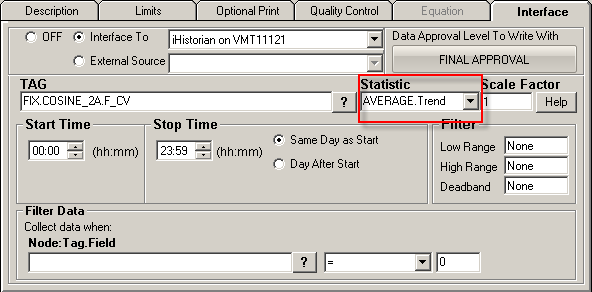The advanced settings pertain to the variable Statistic and how the value is calculated. GE Proficy Historian enables various methodologies to gather data from its archives, and these settings apply most of those capabilities.
1. Changing Sampling and/or Calculation Modes:
The Q12447 inteface uses dot notation in the STATISTIC field. This field can be extended to include sampling mode and calculated mode (when applicable). The format for this is: STATISTIC.SAMPLINGMODE.CALCULATIONMODE. The text entered here is not case sensitive so average.trend is the same as AVERAGE.TREND. Let's look at how we set this up. NOTE: INVENTORY and RAINGAUGE use sampling mode "RawByTime" and cannot be changed.
First, select the Statistic you want for this variable from the drop down list, for example: AVERAGE.
Second, type a dot "." after the statistic and type in the Sampling Mode (from the list below) that you want to use. If you want the Average of the Trend sampling mode, your variable Statistic would look like this: AVERAGE.Trend (as shown below)

Third, and optionally, you can define Calculation Mode if you selected Calculated for the Sampling Mode. Simply add a dot "." after the Sampling Mode and enter one of the Calculation Mode's listed below. If you want the Average of the Calculated Maximum, you would enter the following in the Statistic field: Average.Calculated.Maximum.
NOTE: If you want to import data other than the default sampling mode of 'Lab' you need to specify in the Collector what other types of sampling modes you are interested in. If in the Variable Configuration for the Interface you configure a variable to use a sampling mode 'Interpolated' no results will be returned unless you check 'Interpolated' in the Collector. Also, the more sampling and calculation modes you select in the Collector, the more slowly it will run (i.e. if you select 4 sampling modes the Collector will have to process 4 times as much data as if you just selected the default sampling mode 'Lab')

2. Sampling Modes:
Sampling Mode is the mode of sampling from the archive. The following is supported sampling modes, their definition, and a sample of the query using the statistic AVERAGE for example:
|
SAMPLING MODE |
DEFINITION |
| AVERAGE.INTERPOLATED |
Retrieves evenly spaced interpolated values based on NumberOfSamples and the time frame criteria. |
| AVERAGE.RAWBYTIME |
Retrieves raw archive values based on time frame criteria. |
| AVERAGE.RAWBYNUMBER |
Retrieves raw archive values based on the StartTime criteria, the NumberOfSamples, and Direction criteria. Note the EndTime criteria is ignored for this Sampling mode. |
| AVERAGE.CALCULATED |
Retrieves evenly spaced calculated values based on NumberOfSamples, the time frame criteria, and the CalculationMode criteria. |
| AVERAGE.LAB |
Returns actual collected values without interpolation. |
| AVERAGE.TREND |
Returns the raw minimum and raw maximum value for each specified interval. Use the Trend sampling mode to maximize performance when retrieving data points for plotting. |
3. Calculation Mode - The CalculationMode column only applies if the SamplingMode is set to Calculated. It represents the type of calculation to perform on archive data. The following is supported calculation modes:
|
CALCULATION MODE |
| AVERAGE.CALCULATED.AVERAGE |
| AVERAGE.CALCULATED.COUNT |
| AVERAGE.CALCULATED.MAXIMUM |
| AVERAGE.CALCULATED.MINIMUM |
| AVERAGE.CALCULATED.STANDARDDEVIATION |
| AVERAGE.CALCULATED.TOTAL |
| AVERAGE.CALCULATED.RAWAVERAGE |
| AVERAGE.CALCULATED.RAWSTANDARDDEVIATION |
| AVERAGE.CALCULATED.RAWTOTAL |
| AVERAGE.CALCULATED.TIMEGOOD |
4. Default Settings:
This interface has default settings depending on the statistic selected.
By default SAMPLINGMODE is set to LAB for all statistics except INVENTORY and RAINGAUGE which use RAWBYTIME.
If SAMPLINGMODE is set to CALCULATED, then the following rule is set by default (but can be changed):
|
If STATISTIC is, |
then CALCULATION MODE is |
|
MINIMUM.Calculated |
MINIMUM |
|
MAXIMUM.Calculated |
MAXIMUM |
|
COUNT.Calculated, CYCLE.Calculated, TIMELT.Calculated,
TIMEGT.Calculated, and TIMEEQ.Calculated |
COUNT |
|
[ All Others ].Calculated |
AVERAGE |
This means if you only specify MINIMUM.CALCULATED then the CALCULATION MODE will be set to MINIMUM.